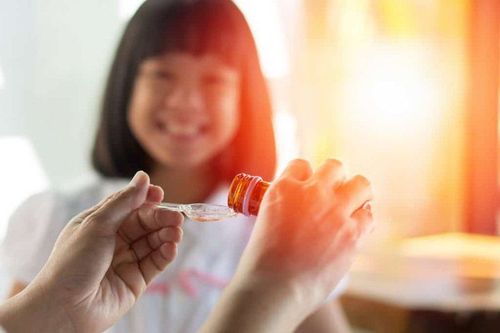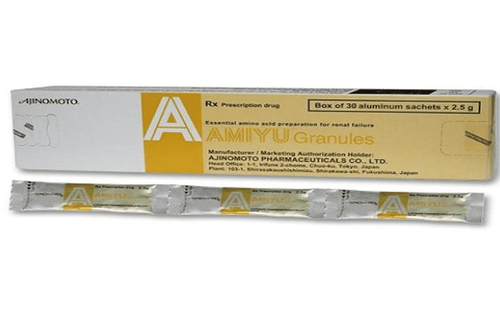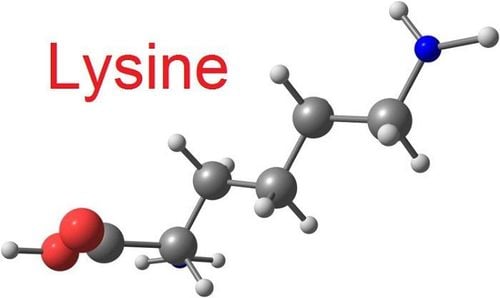This is an automatically translated article.
Lysine is an important amino acid for the body. In fact, the human body cannot produce this amino acid on its own, so it needs to be supplemented from many different food sources. So what time of day should parents give their baby lysine for best absorption?
1. What is Lysine?
Lysine is an essential amino acid for the body, scientifically known as a, e-di amino-n-caproic acid. The body needs lysine to synthesize proteins and metabolize carbohydrates and fatty acids.In addition to helping with growth, lysine is also involved in the production of carnitine, a nutrient responsible for converting fatty acids into energy and helping to lower cholesterol. Lysine helps with collagen production and can also help the body absorb calcium to help children have strong bones and teeth.
If a child does not get enough lysine from his or her diet, he may experience fatigue, nausea, dizziness, loss of appetite, agitation, red eyes, growth retardation, anemia or reproductive disorders in manhood. Accordingly, lysine supplementation for children is necessary in these cases. So how to supplement with lysine for babies?
Currently, there is little first-hand research on the effects of lysine supplements in children. Several researchers at NWFP Agricultural University in Peshawar, Pakistan demonstrated the benefits of adding lysine to wheat in a "Food and Nutrition Bulletin" article published in June 2004. found that children who ate wheat flour supplemented with lysine had significantly increased height and weight compared to children who ate wheat flour without lysine.
Additionally, lysine may provide benefits that have yet to be proven through studies. Specifically, lysine can slow or stop the growth of viruses. It may protect against sexual transmission of the herpes virus. When combined with vitamin C and bioflavonoids, lysine can prevent herpes recurrence. In addition, lysine may improve the way the body uses calcium. It may support the development of the skeletal system. In addition, lysine can also prevent fatigue and increase the body's tolerance to psychological stress.
Food is the best source of lysine for the body. Lysine is found in the following foods:
Beef, pork Poultry Cheese Cod, sardines Eggs Tofu, soybeans Spirulina Dairy products Fermented beer Legumes

Giải đáp cho bé uống lysine vào lúc nào trong ngày?
2. How to use lysine for babies effectively
Similar to other drugs or functional foods, supplementing with lysine for children requires consultation with pediatricians and nutritionists.
Lysine supplements are available in tablet, capsule, powder and liquid form. The liquid form is the most common and easy to find on the market, in which manufacturers often choose the L-lysine group. In case, parents decide how to give lysine to their baby, they should be careful not to combine many dosage forms together. The simultaneous use of several different lysines increases the risk of overdose.
Children 2 to 12 years old can take 23 mg lysine/kg body weight per day. Children under 2 years of age should not take lysine without a doctor's supervision. Children 13 years of age and older can take the recommended adult dose of 12 mg/kg body weight per day. Note, in no case, do not exceed the dose indicated on the product label for the child.
In addition, parents should also pay attention to what time of day to give lysine to their baby? Experts believe that lysine should be added to the body on an empty stomach, to enhance the absorption of lysine in the digestive system. Parents can give the baby lysine as soon as he wakes up and before breakfast.

Mẹ có thể bổ sung lysine cho bé qua thực phẩm hằng ngày
3. Notes to properly supplement lysine for babies
Using a supplement for an amino acid can lead to a negative nitrogen balance in the body. This can reduce the child's metabolic efficiency. It can make your child's kidneys work harder.
In children, single amino acid supplements can cause growth problems. Children should not be given high doses of single amino acids for long periods of time.
Before supplementing with lysine, it should be informed if the child has the following health conditions:
Diabetes Osteoporosis Because lysine can reduce the amount of calcium that the body absorbs, and can interact with some other drugs and supplements. Before giving lysine to your baby, be sure to list any medications and other supplements your child is taking. Lysine should not be taken with certain medicines such as gentamicin, amikacin, kanamycin, netilmicin, neomycin, netilmicin, streptomycin and tobramycin. If a child is taking arginine, arginine may decrease the body's ability to absorb lysine.
The US Food and Drug Administration (FDA) has not approved lysine to treat any medical conditions. Lysine descriptions can vary from company to company, because there is no universally accepted manufacturing standard for this supplement.
Although a life-threatening overdose is unlikely, your child may experience unwanted side effects. Call your doctor at once if your child has signs of a serious allergic reaction, including, difficulty breathing, hives, or swelling of the lips, tongue, or face.
Although all adverse effects are not known, lysine supplements are still evaluated for safety and can be used continuously for 1 year. Common side effects may include abdominal pain and diarrhea.
In summary, lysine is an essential amino acid for the body and brings a lot of benefits to children, but mothers need to supplement lysine properly and scientifically. Like other drugs or dietary supplements, lysine supplementation for children requires consultation with a pediatrician and nutritionist.
For more nutritional knowledge and child care for each age, parents should regularly visit the website vimec.com and make an appointment with the leading doctors, pediatric and nutrition experts of the National General Hospital. Vinmec when needing advice on children's health.













